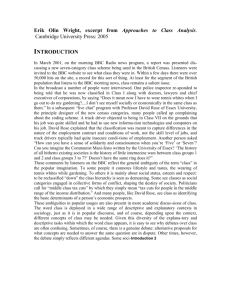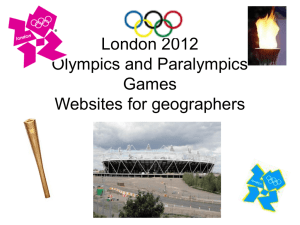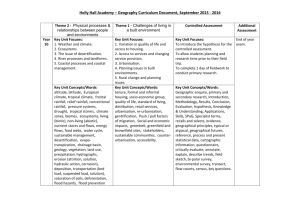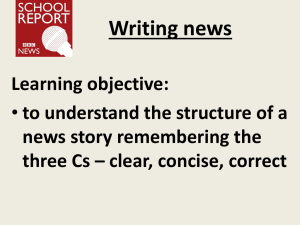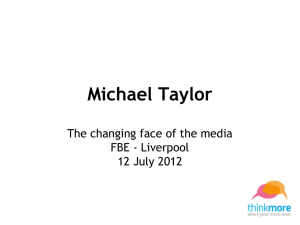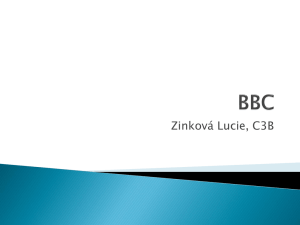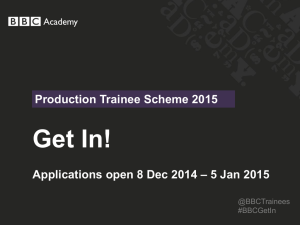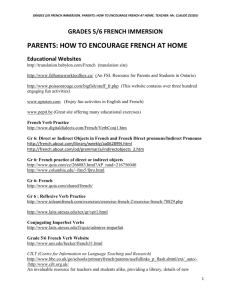BBC2013 - City Blogs
advertisement
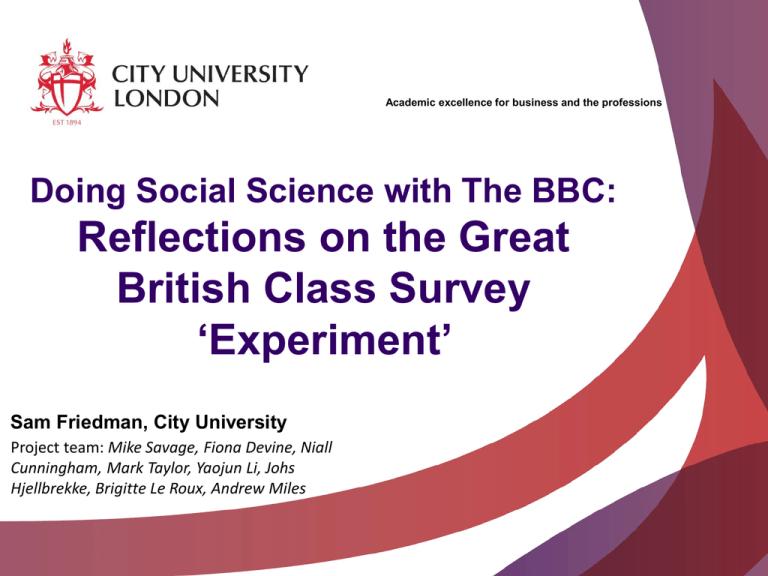
Academic excellence for business and the professions Doing Social Science with The BBC: Reflections on the Great British Class Survey ‘Experiment’ Sam Friedman, City University Project team: Mike Savage, Fiona Devine, Niall Cunningham, Mark Taylor, Yaojun Li, Johs Hjellbrekke, Brigitte Le Roux, Andrew Miles April 3rd 2013 An Explosive Launch • Over 7 million hits on the BBC website • NYT most ‘shared’ world new story of 2013 • One of most tweeted articles in history of social science (altmetric.com) • One of the most popular and controversial pieces of sociology ever conducted in UK • A model for the future? Emergent Service Workers of the World Unite! ‘A political party - but the good kind’ A Rocky Road: The Story of the GBCS • Project developed by BBC’s Lab UK • Attempted to establish ‘public value’ via: • The creation of peer-reviewed scientific knowledge • Popular content for BBC broadcast and web • Initial response to survey was strong with 163,000 taking part...the largest survey on class ever! A Stormy Relationship • Two problems emerged: 1. Time according to academics vs. time according to BBC journalists! 2. The survey sample – highly skewed towards educated middle class (The BBC audience?) • • • • 26% have a post-graduate qualification (10% UK) 25% have an arts/ humanities degree (5% UK) 60% are in professional jobs (23% UK) 1.9% (3,007) have household income of £200k+ (0.3%? UK) Finding a Way Forward • Latent class analysis allowed us to assess how underlying social classes could be defined from specific combinations of economic, social and cultural capital. • Main breakthrough when web survey results were weighted to link to the national survey • BBC decided to launch results as a news story rather than through a documentary Elite Establish ed middle class £47 184 New affluent workers Emergent Precariat service workers £29 252 Technical Tradition middle al classs working class £37 428 £13 305 £21 048 £8 253 £65 844 £1 138 £793 Household income £89 082 Household savings £142,458 £26 090 £4 918 House value £325 000 £176834 £128 639 £163 362 £127 174 £17 968 £26 948 Social contact score 50.1 45.3 37.8 53.5 41.5 38.3 29.9 Social contact number 16.2 17.0 16.9 3.6 9.8 14.8 6.7 Highbrow cultural capital 16.9 13.7 6.9 9.2 10.8 9.6 6.0 Emerging cultural capital 14.4 16.5 14.8 11.4 6.5 17.5 8.4 £9 500 The Results at a Glance • The two ‘traditional’ social classes (middle and working) only comprise 39% of the population • There is clear evidence for social polarisation through the existence of an ‘elite’ and a ‘precariat’ • We see the ‘fracturing’ of the middle classes with a ‘technical’ and ‘affluent’ component • We also see evidence for a relatively youthful ‘emergent’ class with cultural capital but relatively poor labour market position. Translating Different Types of Knowledge • How do you translate complex academic findings into media-friendly formats? • Controversy of the BBC ‘Class Calculator’ • A step too far? Lessons for the Future • A success? – – – – – – Unprecedented public interest Unique experiment in digital social science Successful collaboration between sociology and BBC But scientific impact will take years to assess And Lab UK to close… Does academic knowledge have a role in creating and cultivating public value at the BBC?

